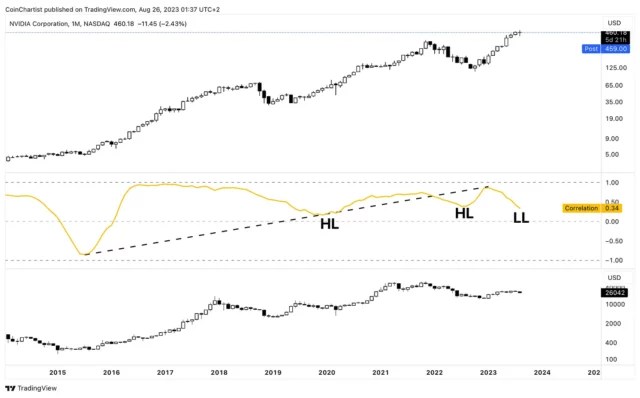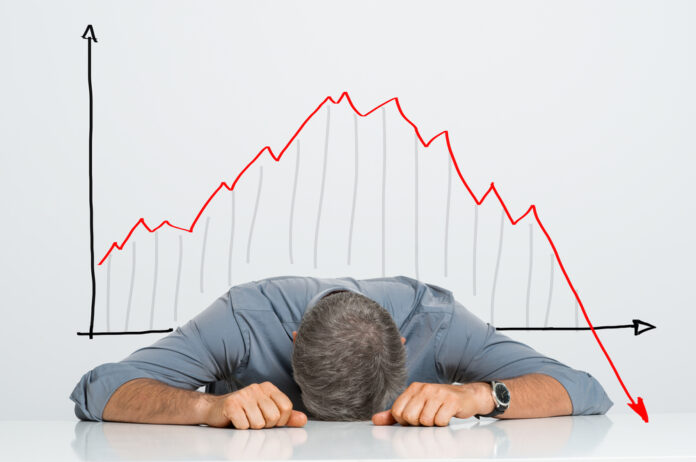The stock market is still within striking distance from former all-time highs set in 2021, yet Bitcoin and other cryptocurrencies feel miles away by comparison.
The two vastly different types of assets that once traded lock and step are now experiencing a significant divergence. Is it time for BTCUSD to kiss its correlation with the stock market goodbye?
Is Crypto’s Correlation With The S&P 500 About To End?
All throughout 2020 the correlation between the stock market and cryptocurrencies was notable. Stock market bubble “froth” as it was referred to at the time was spilling into Bitcoin and altcoins.
The relationship stayed relatively similar all throughout the bear market. The stock market put in a bottom ahead of crypto due to the FTX collapse in November. Since then, stocks have made a stellar comeback, but overall the once volatile cryptocurrency market has been muted.
Is the stock market correlation about to end? | BTCUSD on TradingView.com
The two asset classes previously exhibited a strong correlation according to the Correlation Coefficient between the S&P 500 and BTCUSD, but it is at risk of breaking down in the coming months if price action doesn’t come more into parity.
The Correlation Coefficient measures not just the strength but the direction of the relationship between any two assets, and the direction is currently pointed down. This suggests that the correlation will continue to weaken unless the relationship reverses course.

Nvidia/BTC Correlation Coefficient loses uptrend | BTCUSD on TradingView.com
Bitcoin Breaks Up With Nividia After 8-Year Relationship
One potential early indication that the uptrend in the Correlation Coefficient between the S&P 500 and BTCUSD might break down, is because the same tool and strong correlation between Bitcoin and Nvidia has since started to fall.
The previous series of higher highs and higher lows just met its first lower low. If a lower high on the Correlation Coefficient forms next, it could spell the end between any correlation between crypto and traditional markets.
This isn’t all bad, however, as portfolio managers often seek to diversify with assets that have a negative correlation with stocks. If the Correlation Coefficient drifts there, the asset could become interesting for different reasons. In the past, Bitcoin was positioned as an alternative asset class with little to no correlation with the stock market.
The COVID price shock caused many uncorrelated assets to sudden become tightly correlated, and that relationship could now be fading. Bitcoin is instead showing an increasingly strong correlation with Gold, which could ultimately bode well for the top cryptocurrency by market cap.
Credit: Source link






















 Bitcoin
Bitcoin  Ethereum
Ethereum  XRP
XRP  Tether
Tether  Solana
Solana  USDC
USDC  Dogecoin
Dogecoin  Cardano
Cardano  Lido Staked Ether
Lido Staked Ether  TRON
TRON  Wrapped Bitcoin
Wrapped Bitcoin  Wrapped stETH
Wrapped stETH  Chainlink
Chainlink  Avalanche
Avalanche  Sui
Sui  Stellar
Stellar  Litecoin
Litecoin  Toncoin
Toncoin  Shiba Inu
Shiba Inu  Hedera
Hedera  LEO Token
LEO Token  USDS
USDS  Hyperliquid
Hyperliquid  Polkadot
Polkadot  WETH
WETH  MANTRA
MANTRA  Bitcoin Cash
Bitcoin Cash  Bitget Token
Bitget Token  Ethena USDe
Ethena USDe  Wrapped eETH
Wrapped eETH  Uniswap
Uniswap  Monero
Monero  NEAR Protocol
NEAR Protocol  Pepe
Pepe  WhiteBIT Coin
WhiteBIT Coin  Aave
Aave  Ondo
Ondo  Bittensor
Bittensor  Aptos
Aptos  Internet Computer
Internet Computer  Dai
Dai  Official Trump
Official Trump  Mantle
Mantle  Ethereum Classic
Ethereum Classic  Tokenize Xchange
Tokenize Xchange  OKB
OKB  Gate
Gate  sUSDS
sUSDS  Coinbase Wrapped BTC
Coinbase Wrapped BTC 
